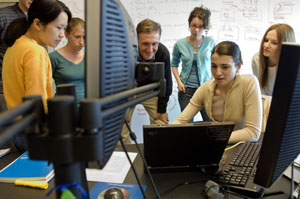 UW CSE is one of 24 academic programs and corporations that are members of the “NCWIT Pacesetters” program of the National Center for Women and Information Technology – committed to fundamental enhancements in their recruitment and retention of women.
UW CSE is one of 24 academic programs and corporations that are members of the “NCWIT Pacesetters” program of the National Center for Women and Information Technology – committed to fundamental enhancements in their recruitment and retention of women.
At the Pacesetters Roundtable in Boulder CO on October 23 and 24, here’s what we said:
Here’s our philosophy at the University of Washington:
- Yes, including more women in the field is important as a matter of equity.
- And yes, it’s important from a workforce point of view.
- But it’s also important because of quality. We’re designing systems for the entire population to use, so the entire population needs to be involved in the design of those systems.
We’ve always worked hard to create a welcoming and supportive environment, and to get the word out. Our numbers are better than most. But we’re still not where we need to be.
Under the Pacesetters program, we committed to further gains. At the University of Washington, students enter as pre-majors and choose majors after fulfilling pre-requisites, so we’ve focused on freshmen. Here are some of the things we’ve added:
- We target freshman honors students with a new course called “Brave New World: Scientific, Economic and Social Impact of Computer Science” which has attracted significant numbers of female students.
- We created honors sections in our introductory programming courses which similarly have attracted significant numbers of female students.
- We focus on consistent, encouraging communication to students in Introductory Programming. This includes:
- Emails sent to high achievers in the course suggesting they consider applying to the major;
- Social events where we invite women to network with faculty, students and staff;
- And a special women’s seminar linked to our introductory courses in which women are introduced to the breadth and depth of the field by visiting local companies, listening to student panels, seeing research presentations, and talking about their experiences in the courses.
We’ve found that more than half of our new Computer Science and Computer Engineering majors had no intention of choosing these majors when they enrolled in the introductory course. So making this course welcoming and exciting is incredibly important.
We added these new initiatives to existing activities such as:
- Google-sponsored summer workshops for high school math and science teachers.
- “Inspirational teacher” recognition for high school teachers who send us great students.
- And videos dispelling myths and stereotypes about the field.
We have not yet fully met our Pacesetters goals, but we’re committed to these goals, and we’re well on the way.
See an NCWIT press release on Pacesetters here. Learn about Computer Science and Computer Engineering as majors here. Read more →
 Why are video games the key to modern science? “Video gamers spend tons of time — for many it’s 10,000 hours by age 21 — battling mythic monsters, shooting aliens and rescuing princesses from digital castles.”
Why are video games the key to modern science? “Video gamers spend tons of time — for many it’s 10,000 hours by age 21 — battling mythic monsters, shooting aliens and rescuing princesses from digital castles.”
To harness these efforts, CMU faculty member (and UW CSE PhD alum) Adrien Treuille created two online games — Foldit and EteRNA — “that put video gamers to work solving epic scientific puzzles.” And the results have been staggering. For example, as reported in the journal Nature earlier this month, Foldit players helped solve a puzzle about proteins that could further research into HIV/AIDS.
“Treuille has high hopes for gaming’s potential to unlock good in humanity — and impact the real world. ‘People can solve much more complex problems online at the edge of human knowledge, and I think we’ve just scratched the surface.'”
Read the full CNN article here. Read more →
 Recent issues of Seattle Met magazine have included a feature on “The Perfect Party” – a group of five individuals who they’d love to invite for a meal. UW CSE was included early-on in the person of computer security researcher Jake Appelbaum – part of a “Perfect Party” that included Rachel the Pig. In the November issue, it’s UW CSE’s Shwetak Patel – part of a “Perfect Party” that includes Tom Brokaw. (Sorry, Jake!) Read more →
Recent issues of Seattle Met magazine have included a feature on “The Perfect Party” – a group of five individuals who they’d love to invite for a meal. UW CSE was included early-on in the person of computer security researcher Jake Appelbaum – part of a “Perfect Party” that included Rachel the Pig. In the November issue, it’s UW CSE’s Shwetak Patel – part of a “Perfect Party” that includes Tom Brokaw. (Sorry, Jake!) Read more →
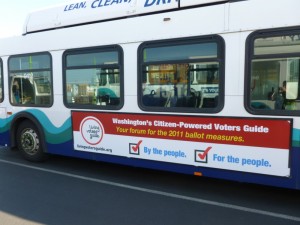 The Living Voters Guide is a free and non-partisan forum for civic discourse – a service provided by Seattle City Club and the University of Washington. Even more cool than that, it’s being advertised on the side of buses!
The Living Voters Guide is a free and non-partisan forum for civic discourse – a service provided by Seattle City Club and the University of Washington. Even more cool than that, it’s being advertised on the side of buses!
Read more →
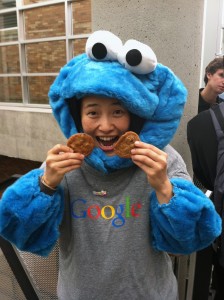
 “Invigorating chaos” is the only way to describe it!
“Invigorating chaos” is the only way to describe it!
Google’s Yin Lu wins the “best costume” award (snatching it from Zillow, the 2010 and 2009 winner – see 2009 photo here … maybe Yin re-used the hair …).
See the list of recruiting companies here. See Bruce Hemingway’s many wonderful photographs here.
On a less upbeat note, Indochino Apparel wins this year’s “shunned because of sexist swag” award. Kudos to multiple students, male and female, for expressing concern. Read about last year’s winner here. Sexism must not and will not be tolerated. Read more →

Gabe Cohn
GeekWire reports on the UW CSE Affiliates meeting:
“Maybe this is a commentary on my own bad habits, but WalkType was one my personal favorites among some 70 projects on display last night during an open house and poster session at the department’s annual Industrial Affiliates meeting. The annual Madrona Prize, handed out by Madrona Venture Group, went to UW student Gabe Cohn and the “Humantenna” project, which uses a receiver on the human body to determine a person’s position in relation to electrical noise emanating from a home’s wiring system.”
Read the full post here. Read more →
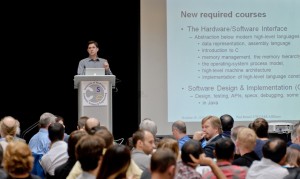
Paul Beame describes recent curricular revisions - very well received by Affiliates
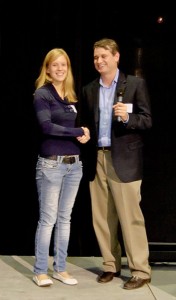
Greg Gottesman congratulates Franzi Roesner, runner-up for the annual Madrona Prize for research
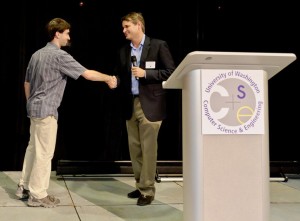
Greg Gottesman congratulates Gabe Cohn, winner of the annual Madrona Prize for research
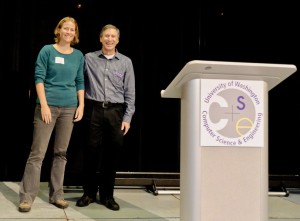
Hank Levy congratulates Nicki Dell, winner of the People's Choice prize for research (provided by Madrona Venture Group)
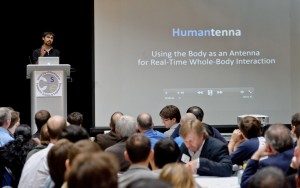
MacArthur Award winner Shwetak Patel describes his research
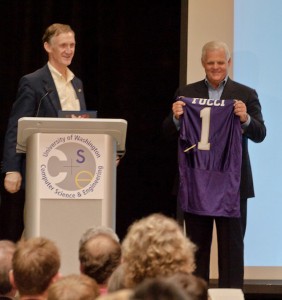
Joe Tucci, Chairman and CEO of EMC, receives a Husky football jersey following his keynote address
UW CSE annually hosts a day of research presentations for members of our Affiliates program, capped by an evening of posters and demos to which we also invite regional alumni and friends. More than 100 Affiliates spent the day with us today, and more than 100 alumni and friends joined them this evening. Many Bruce Hemingway photos here and here. Read more →
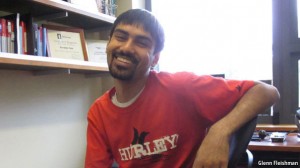 We hear you – you’re thinking “Geez, haven’t we read enough about Shwetak this week/month/year?”
We hear you – you’re thinking “Geez, haven’t we read enough about Shwetak this week/month/year?”
But how can you possibly resist an article that refers to Shwetak as “The 29-year-old boffin” and “A relative stripling”???
Gotta love those Brits! Read it here. Read more →
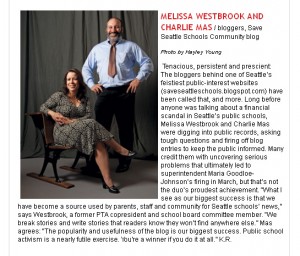 Shame on us. On first reading, we only noticed Shwetak Patel as a CSE family member recognized by Seattle Magazine in its annual “Most Influential” feature. But Seattle Schools activist Melissa Westbrook, wife of long-time CSE faculty member Gaetano Borriello, is there too!
Shame on us. On first reading, we only noticed Shwetak Patel as a CSE family member recognized by Seattle Magazine in its annual “Most Influential” feature. But Seattle Schools activist Melissa Westbrook, wife of long-time CSE faculty member Gaetano Borriello, is there too!
“Tenacious, persistent and prescient: The bloggers behind one of Seattle’s feistiest public-interest websites (saveseattleschools.blogspot.com) have been called that, and more… ‘What I see as our biggest success is that we have become a source used by parents, staff and community for Seattle schools’ news,’ says Westbrook, a former PTA copresident and school board committee member. ‘We break stories and write stories that readers know they won’t find anywhere else.'”
Read the writeup on Melissa here and the full article here. Read more →
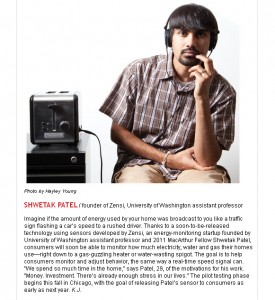 Every year, Seattle Magazine recognizes a handful of individuals in its “Most Influential” feature. This year, UW CSE’s Shwetak Patel is among those recognized:
Every year, Seattle Magazine recognizes a handful of individuals in its “Most Influential” feature. This year, UW CSE’s Shwetak Patel is among those recognized:
“Imagine if the amount of energy used by your home was broadcast to you like a traffic sign flashing a car’s speed to a rushed driver. Thanks to a soon-to-be-released technology using sensors developed by Zensi, an energy-monitoring startup founded by University of Washington assistant professor and 2011 MacArthur Fellow Shwetak Patel, consumers will soon be able to monitor how much electricity, water and gas their homes use—right down to a gas-guzzling heater or water-wasting spigot.”
Read the writeup on Shwetak here and the full article here. Read more →
 UW CSE is one of 24 academic programs and corporations that are members of the “NCWIT Pacesetters” program of the National Center for Women and Information Technology – committed to fundamental enhancements in their recruitment and retention of women.
UW CSE is one of 24 academic programs and corporations that are members of the “NCWIT Pacesetters” program of the National Center for Women and Information Technology – committed to fundamental enhancements in their recruitment and retention of women.















